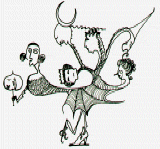Jewelry
boxes and cabinets

Request
current list of available Jewelry boxes.
writing-boxes
jewelry-boxes
tea caddies
sewing-boxes
contents
| |
\
Antique Fully fitted Coromandel
Dressing Box with silver topped crystal by PIttway Brothers Circa 1863
Please click on images to enlarge | slide show | thumbnail index |Request
current list of available Jewelry boxes.
Reference: JB318
Description:
JB318: A very fine fully fitted figured coromandel dressing
box by the Pittway Brothers with engraved and gilded Bramah
lock, stop hinges and accents and having a sprung drawer fitted for jewelry.
Inside the box is fully fitted lined with leather and velvet and retains
its cut crystal bottles and jars with hallmarked silver tops decorated
with chassed repoussé work and engine turning. There is a lift out tray
with further tray containing dressing accessories. There is a lift out
reversible mirror and document wallet in the lid. Circa 1863.
Origin: UK, London, Pittway
Brothers Hatton Gdn.
Circa: 1863
Size: 32.3 cm wide by 23.5 cm by 19 cm: 12.7 inches wide by
9.3 inches
by 7.5 inches.
Condition: Good
overall, working lock and key some veneer cracking (see images)
which does not effect the integrity structurally.
|
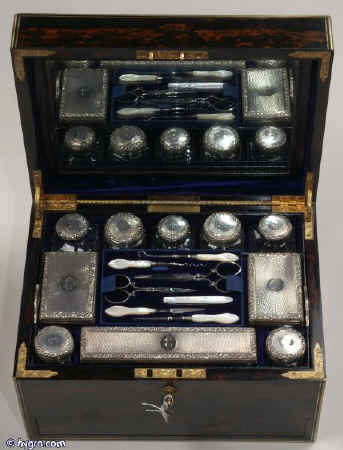
|
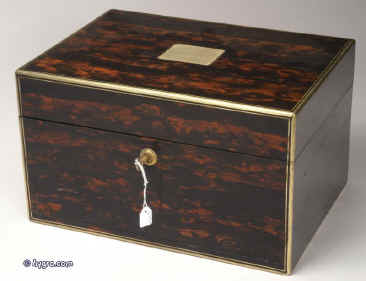
|
The figured coromandel is
edged with contrasting rounded brass which both protects the edges and
has decorative interest.
|
Please click on images to enlarge | slide show | thumbnail index |Request
current list of available Jewelry boxes.
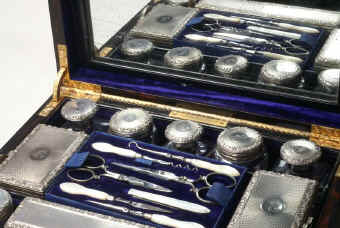
|
Inside the box is fully
fitted lined with leather and velvet and retains its cut crystal bottles
and jars with hallmarked silver tops decorated with chassed repoussé
work and engine turning. There is a lift out tray with further tray containing
dressing accessories.
|
Please click on images to enlarge | slide show | thumbnail index |
The box has a lower sprung
drawer fitted for jewelry. The drawer is released by pressing the plate
in the back facing.
|
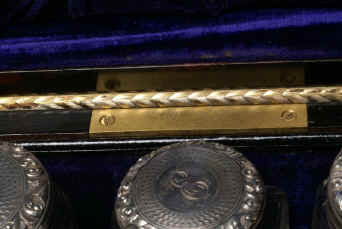
|
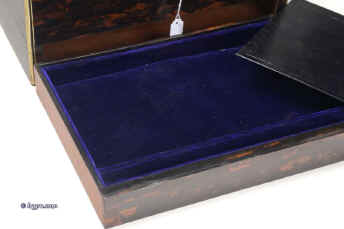
|
The drawer is velvet lined and fitted for jewelry
and has a supplementary embossed leather lid
|
Please click on images to enlarge | slide show | thumbnail index |Request
current list of available Jewelry boxes.
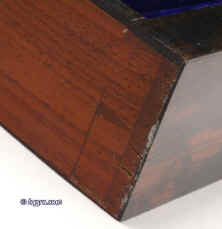
|
The drawer is of dovetail construction. The
cabinet markers markings are still visible. The drawer is as the box of
mahogany construction and veneered with thick saw-cut veneers of highly
figured coromandel. Coromandel is a figured form of ebony.
|
The elaborately engraved stop hinges are
engraved and gilded. The engraved screw heads are aligned.
|
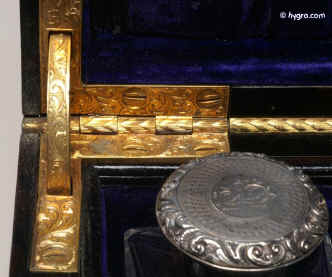
|
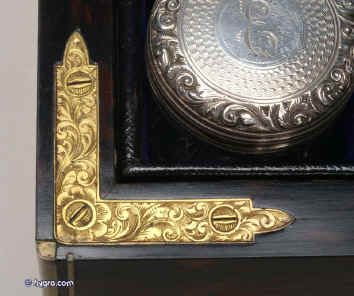
|
The facings have inlaid gilt brass corner
plates. These are decorated with chassed foliate motifs. Even the screw
heads have engraving and the slots are aligned.
|
Please click on images to enlarge | slide show | thumbnail index |
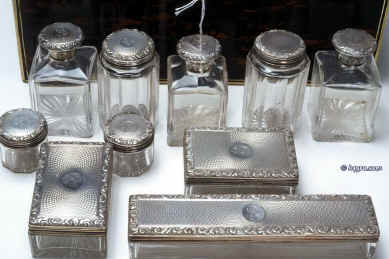
|
The box contains cut lead
crystal cosmetic jars and scent bottles with hallmarked silver tops.
|
Please click on images to enlarge | slide show | thumbnail index |Request
current list of available Jewelry boxes.
The glass lead crystal is hand blown before being cut
with facets. There is a radiating star motif cut into the bases.
|
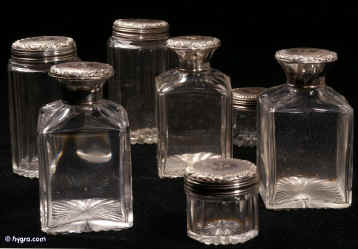
|
The silver tops of the boxes have been profusely
decorated with engine turning framed with a chased Repoussé border
depicting a flowing stylized foliate motif. A central cartouche is
decorated with an engraved "E".
The purpose of engine turning is to create
a surface which is decorative and tactile.
David
Pledge, a modern practitioner, who has published a resource on the
web writes:
"Engine Turning, in French:
"guilloché", is really a branch of what the English call
Ornamental or Complex Turning. It is a process in which a (generally)
metal work piece is moved mechanically against a fixed tool to cut a
series of uniformly defined lines. It is rather like engraving with a
ruler, or technical drawing on metal, though it does not look like
technical drawing, rather a decorative surface which reflects light in
an interesting way and has a tactile value as well."
|
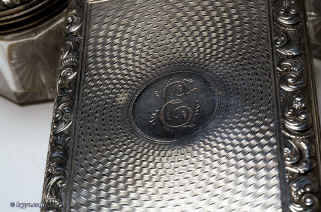
David Pledge has published "The
Illustrated Engine Turning Reference™" which he describes as:
"AN EDUCATIONAL RESOURCE FOR
STUDENTS, USERS AND PRACTITIONERS"
"Here you will find everything you ever wanted to know about
the Engine Turning Design Medium.
This is the definitive reference work on engine turning. As an On Line
Live resource it is continuously being updated. We invite you to
contribute to this resource with the intention of making it the sum of
all knowledge on the subject."
For more information on the process of engine turning
see David Pledge's very informative web resource :
www.pledge.co.uk/pledge_and_aldworth/ref/refconts.htm
|
Please click on images to enlarge | slide show | thumbnail index |
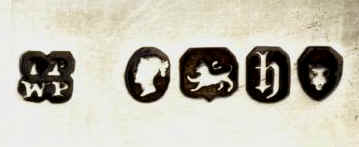
Makers mark, Queen's head, lion passent, date letter "h"
and leopard's head for London.
|
The maker's/sponcer's mark is
"IP over WP"
Pittway Brothers (John Pittway & William Pittway)
(entered May 1860)
I.P over W.P
Pittway Bros -John & William Pittway
London 1861 hallmark
Business of John Pittway and William Pittway at 4 Kirby Street, Hatton
Garden, London as Pittway Brothers. The partnership was dissolved in
1861 and continued by William Tween and Frederick Purnell.
http://www.silvercollection.it/englishsilvermarksXI.html
"John Pittway, London cabinet maker (1803-39). At
47 Baldwins Gds, 1803-11. In 1811 described as 'mahogany & inlaid
case maker' In1803 insurance cover was £900 of which £800 was for
utensils and stock. The corresponding figures for 1808 are £1000 and
£600. No further references occur to this maker until 1839 when he was
at 4 Kirby St., Hatton Gdn. as a cabinet maker and upholsterer.
" See: Dictionary
of English Furniture Makers, 1660-1840
In 1835 John Pittway gave evidence against an employee he was accusing
of embezzlement at the Old Bailey.
" JOHN PITWAY . I am a
cabinet-maker, and live in Kirby-street, Hatton-garden. The prisoner had
been with me two years and a half—I gave orders for him to be sent for
this money—it was his duty................"
See: Old
Bailey proceedings
|
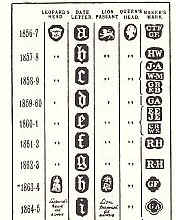
This is the entry for London 1863-4
in English Goldsmiths and Their Marks by Sir Charles J. Jackson
|
"h" is the date for 1863-4 although some
silver for 1863 was marked with the higher Britannia mark. much was hall
marked with the more usual London markings denoting sterling silver.
|
Please click on images to enlarge | slide show | thumbnail index |
Chassed repoussé work with a foliate motif,
frames circular engine turning depicting a basket weave pattern.
|
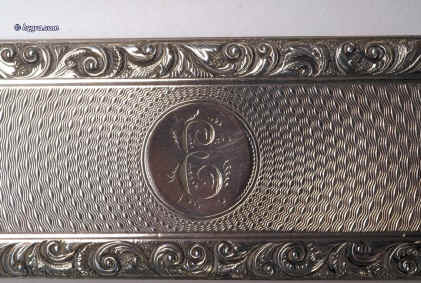
|
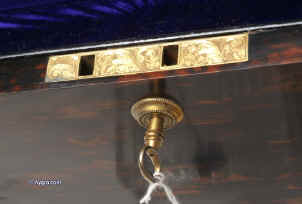
|
The plate of the Bramah lock is stamped
"Bramah" and engraved with foliate forms and gilded. The box
retains its original key which is also gilded. It is the attention to
detail which makes this box special.
The working lock is Made by
Bramah.
The patented Brahma lock.
To engage the key is pushed into the lock. The sprung
levers of the lock are brought to the right positions by grooves cut in
the barrel of the key rather than the flag.
see: http://hygra.com/locks/Bramah/
|
Please click on images to enlarge
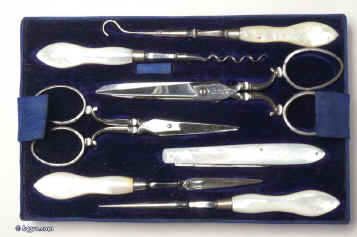
|
There is a central lift out
tray containing matched cut steel scissors and tools with mother of
pearl handels, including penknife, nail-file (repaired), bodkin,
corkscrew, bodkin, and boot-hook.
|
Please click on images to enlarge | slide show | thumbnail index |Request
current list of available Jewelry boxes.
Please click on images to enlarge | slide show | thumbnail index |
Please click on images to enlarge | slide show | thumbnail index |
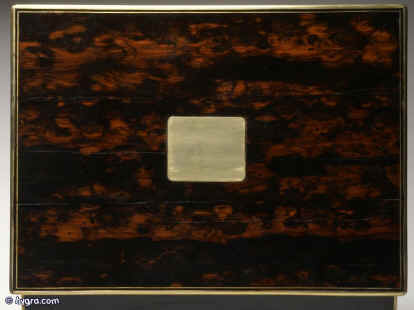
|
The figure of the coromandel
is particular with contrasting tones of brown and black.
|
Please click on images to enlarge | slide show | thumbnail index |Request
current list of available Jewelry boxes.
Please click on images to enlarge | slide show | thumbnail index |
The brass edging also surrounds the base of the
box which has further facings and a covering of velvet so as not to
scratch surfaces on which the box is placed.
|
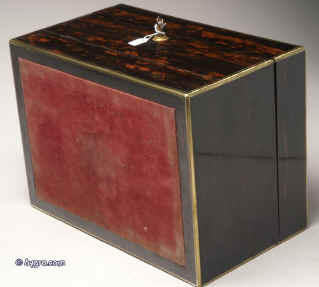
|
Please click on images to enlarge | slide show | thumbnail index |
All text and images and linked images are ©
1999-2008 Antigone Clarke and Joseph O'Kelly. If you require any further
information on permitted use, or a licence to republish any material, email us
at copyright@hygra.com
|
